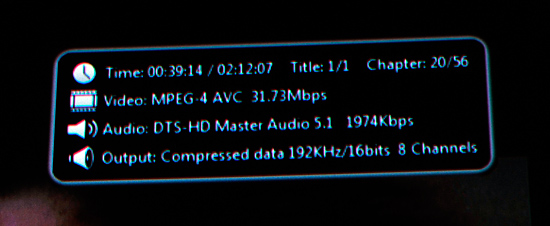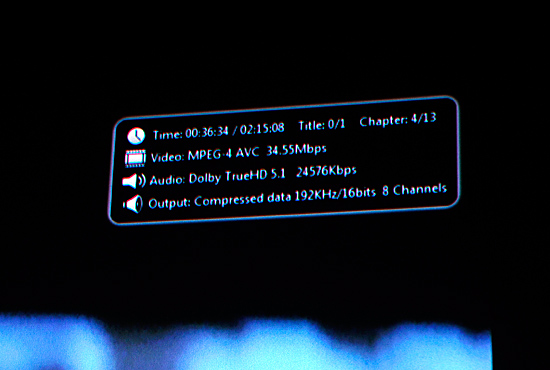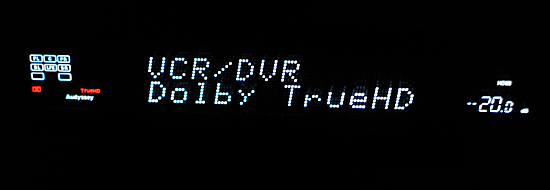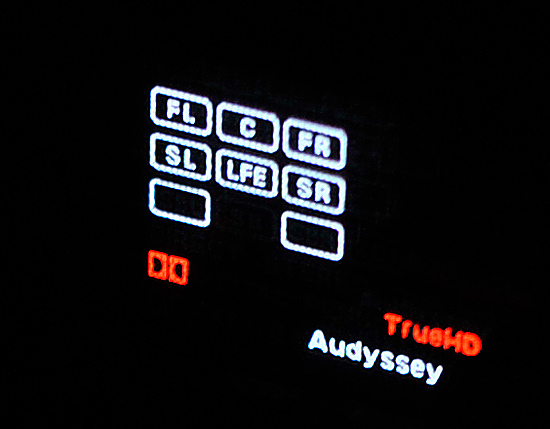Auzentech HomeTheater HD Preview: Bitstreaming True HD/DTS-HD MA
by Anand Lal Shimpi on September 2, 2009 12:00 AM EST- Posted in
- GPUs
The First Attempt: Failure
This was the email I sent Auzentech after spending a full day with the card trying to get it to work:
I've been working with the Auzen Z-Fi HomeTheater HD card for most of the past 24 hours and thus far I have not been able to get it to reliably work in the vast majority of situations. Here's what I've tried:
Under Windows 7 x64
1) On a Zotac GeForce 9300 motherboard with integrated graphics I get no video output from the Auzen card on my Westinghouse LVM-42w2 42" LCD.
2) On an Intel P55 motherboard with GeForce GTX 280 graphics card I get no video output from the Auzen card on my Westinghouse LVM-42w2 42" LCD.
3) On a Zotac GeForce 9300 motherboard with integrated graphics I get no video output from the Auzen card in my home theater setup: Integra DTC-9.8 preprocessor + JVC RS2 projector.Under Windows Vista 32-bit:
1) On an Intel P55 motherboard with GeForce GTX 280 graphics card I am limited to 720p output from the Auzen card on my Westinghouse LVM-42w2 42" LCD. Selecting 1080p simply produces no-signal on the Westinghouse.
2) On an Intel P55 motherboard with GeForce GTX 280 graphics card I get no video output from the Auzen card in my home theater setup: Integra DTC-9.8 preprocessor + JVC RS2 projector.
3) On an Intel P55 motherboard with GeForce GTX 280 graphics card I get no video output from the Auzen card in my secondary home theater setup: Onkyo TX-SR806 receiver + Samsung 50" TV.
4) On an Intel P55 motherboard with GeForce GTX 280 graphics card I get no video output from the Auzen card on my Toshiba 42" Regza LCD TV.In all cases I confirmed that both the LED lights (HDMI in and HDMI out) were illuminated. I tried both an HDMI cable from the GPU to the Auzen card as well as DVI-to-HDMI from the GPU to the Auzen card, neither worked. I even tried the internal HDMI passthrough jumper on the NVIDIA chipset to no avail. I used the drivers off of the CD that came with the card and then installed the updated drivers you sent Gary.
I was ready to give up on it. I went to bed, finished up The SSD Relapse the next day and tried one last thing before I gave up on it again: switch to a non-NVIDIA card.
The one thing both of my test platforms had in common was their NVIDIA graphics using the latest 190 series drivers. I swapped an ATI Radeon HD 4890 into the P55 board, installed its drivers and it worked right away; under both Windows Vista 32-bit and Windows 7 x64.
I’m not sure what the NVIDIA/Auzen incompatibility was, and perhaps switching to an arbitrary older driver would fix it but with a working setup I wasn’t about to try and figure it out. For what it’s worth, the NVIDIA/Auzentech combo did work perfectly on my Dell WFP3008 30” display; too bad it doesn’t have a built in receiver to make that useful.
The Second Attempt: Success
With an AMD GPU on the P55 board everything worked perfectly; I took the system sans case down to my theater, hooked it up and threw on a couple of BDs. I hadn’t seen Die Hard in a while and it has a DTS-HD MA track, so I popped that in to verify that it was working.

There are some UI bugs with the PowerDVD 9 control panel that enables bitstreaming these codecs. You basically have to select your audio output settings twice to get it to work; change your audio output once to something other than bitstreaming then once more to bitstreaming (Non-decoded high-definition audio to external device) to make it work.
Once playing, the thing worked as advertised:

Update: As readers have correctly pointed out it looks like PowerDVD is reporting its output incorrectly, but the card is functioning as intended here. It would be impossible to down-sample the compressed True HD/DTS-HD MA streams without decoding them. It also looks like the audio bitrate in The Hunt for Red October is being incorrectly reported.
Next up we have a Blu-ray of The Hunt for Red October, this time a TrueHD disc:













76 Comments
View All Comments
Mempile - Thursday, September 17, 2009 - link
Thanks, but no thanks, Auzentech and Asus. I'll get a PS3, which is simpler, smarter, and probably better.cubdukat - Friday, September 4, 2009 - link
I've been waiting for this card to come out ever since it was announced, because I had read that Auzen's X-Fi cards were a quantum leap over Creative's as far as general stability and audio quality were concerned. However, this review is giving me pause.Auzen made a point of trumpeting its collaboration with both Nvidia and Cyberlink on the card's design. That it seems to be having such issues with Nvidia chipsets is not a good sign. I am using a GeForce 8200-powered mobo with a 9800GT card, and I have no intention of crossing over to ATI or Intel in order to use this card. I certainly hope that either Nvidia and/or Auzen fixes this problem soon.
The second issue I have is that Auzen has stated that not only will there be no Linux support for DTS Connect and Dolby Digital Live, they will also not even provide rudimentary Linux drivers for the card either. Now, for most people this is a non-issue, but I also dual-boot a Linux multimedia distro called Mythdora, and that's a deal-breaker for me.
As it stands right now, I am torn between getting this card or one of the Creative PCI-e X-Fi cards. On one hand, it's perfect for my HTPC setup because I can bitstream TrueHD and DTS-HD to my receiver or output the uncompressed LPCM without downsampling. On the other, I don't want a card that I am going to have to fiddle with, as I already have too many components in my system that fit that description, not to mention that the Creative card does have Linux support. So I think I'm gonna wait and see how this shakes out...
CDJay - Saturday, September 5, 2009 - link
See, I've been waiting for this card for entirely different reasons....I have a "HTPC", but I don't use it for DVD or Blu-ray, at least atm. No, I use it as an easy way to play music, or games at 1080p. So whilst I could get a PS3 Slim ( I have a normal PS3, I just never use it ) I'd be stuck w/ games that cost more, and run at resolutions that look utterly horrific on my 65" screen.
So in fact the reason I wanted this card, and indeed why it is now sitting in my PC, is so I can play stuff like Race Driver Grid, Street Fighter IV, Pro Evo 2009, Crysis, Bioshock, Call of Duty Modern Warfare yada yada yada at 1080p/60hz and with PCM over HDMI. Some games ( Streetfighter IV and Pro Evo 2009 I am looking at you ) don't make use of my 7.1 setup, but Race Driver Grid and Crysis most certainly do. I had a Creative X-Fi Fatal1ty using the multichannel input on my audio processor, but that bypasses the decent Audyssey MultiEQ Pro room correction and bass redicrection and thus sounded fairly crappy. I could use Dolby Digital live, but that's lossy and limited to 5.1.
So to sum up, if I want to listen to lossless stereo, 5.1, 7.1 for music and games this card is the only practical option. Before anyone asks, I have a Xonar HDAV 1.3 sitting in a cupboard upstairs, I didn't enjoy the horrific driver issues and stereo Race Driver Grid etc.
This is a niche product, sure, but if anyone has the money to burn on having a true 1080p/60fps/multichannel audio gaming setup for multiplatform or PC specific titles this is a VERY interesting product indeed. IMO, YMMV.
archer75 - Thursday, September 3, 2009 - link
Just rip your blu-rays to your hard drive, NAS, server, whatever and rip that audio as lossless flac. Stream to receiver as LPCM.You get 100% of that DTS-HD MA or TrueHD with none of the DRM and no need to buy expensive sound cards either. Simple.
DominionSeraph - Saturday, September 5, 2009 - link
Simple... and illegal under the DMCA.medi01 - Tuesday, September 8, 2009 - link
Is ripping DVDs legal?wonder1980 - Thursday, September 3, 2009 - link
please do a comparison between x-fi and ATI 4650 if possible, thanks a lot! Do you think the difference worth $200?archer75 - Friday, September 4, 2009 - link
If you are using a digital connection such as HDMI, optical, etc. there is no difference. It just passes the audio straight out. You don't even need a soundcard for this.Either you are bitstreaming it out or your player is decoding it and passing out LPCM. But the sound card is just shipping the audio out.
If you are talking analog audio then yes, the soundcard will make a difference.
chizow - Thursday, September 3, 2009 - link
Anand or anyone else who has this card already,Can you measure the card's dimensions? Particularly the length? Trying to see if it'll fit in a Classified's x1 PCIE slot. Amazingly Auzentech's website documentation and even their manual PDF do not list any dimensions or a detailed schematic drawing.
Thanks for the review, sounds like it'll do what it advertises. One key thing I didn't see mentioned or emphasized though is that this card also retains all of the X-Fi's EAX capability in games and should also be able to encode them as DD Live/DTS Interactive over HDMI. Sound quality will be the same as previous PCIE or PCI X-Fi cards for games, but it'll be the first sound card to offer this all natively over HDMI.
Also curious if passing video through the sound card has any negative aspects, perhaps input lag, decreased quality or framerate limits.
chizow - Thursday, September 3, 2009 - link
Here's the part that concerned me about the HDMI passthrough aspect, as taken from Auztentech's website about the Silicon Image chips used:http://www.auzentech.com/site/products/x-fi_hometh...">http://www.auzentech.com/site/products/x-fi_hometh...
The bolded portion being the biggest concern. Will the card be able to pass higher resolutions than 1920x1080p @ 60Hz or 1600x1200 @ unknown refresh? Or will it cap frames due to limited bandwidth, or simply refuse to pass higher resolution signals?